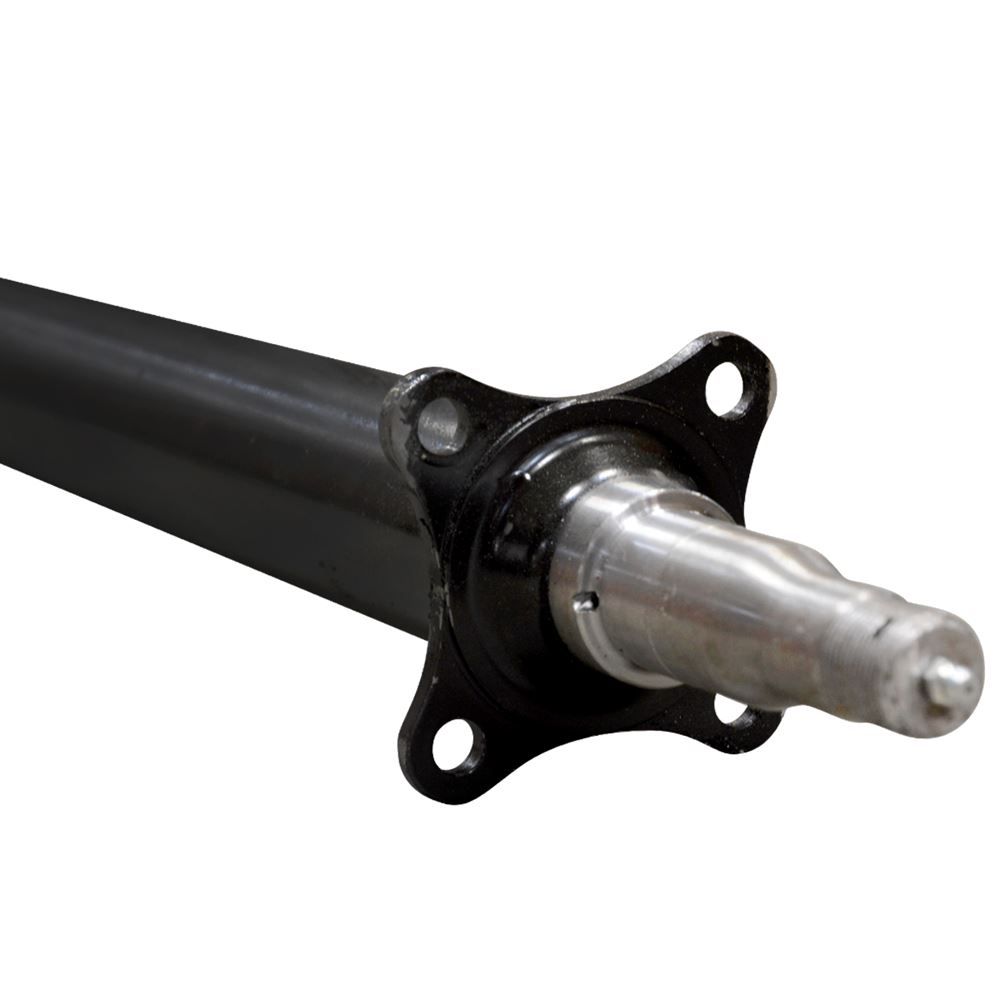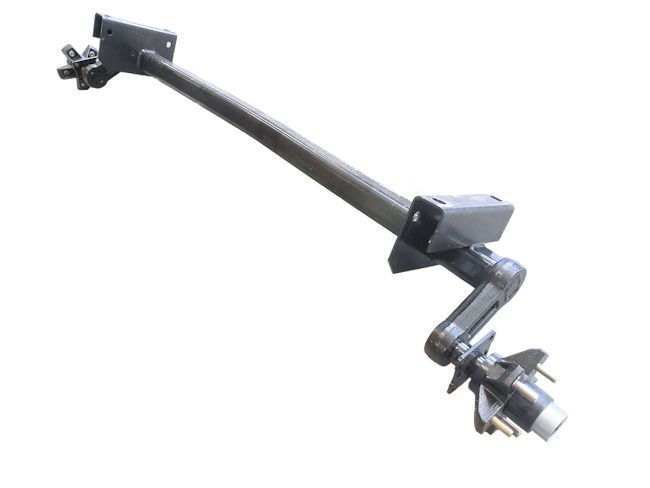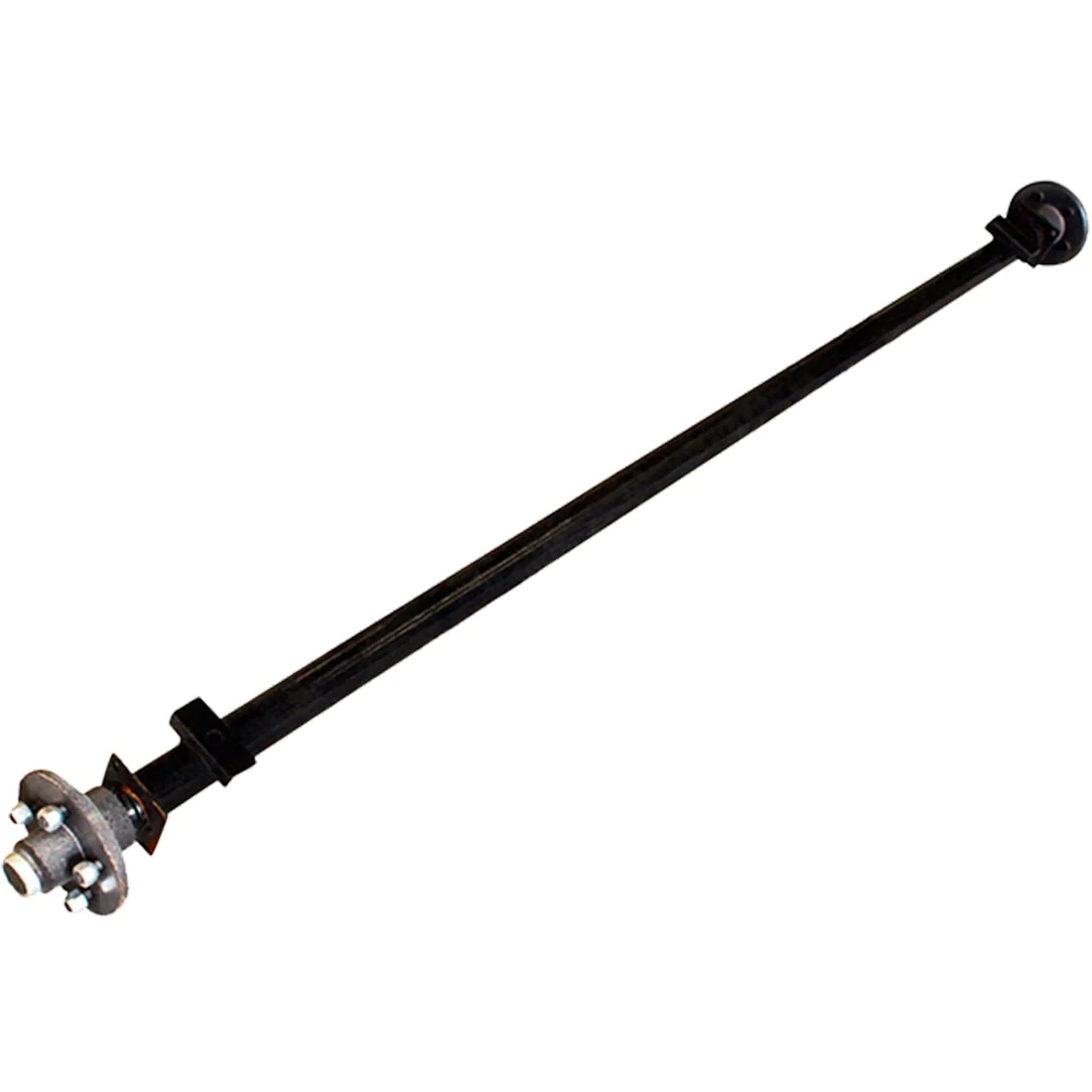Product Description
Trailer parts trailer Axle for Truck Trailer Semi Trailer cheap price for Sale
Product Description
We have 6 types of axles
- American type axles (Inboard type and outboard type )
- Germany type axles ( Wheel type and spider type )
- English type axles ( 8 holes, 10 holes / ISO BSF JAP )
- Lowbed axles / concave axles
- Agricultural axles ( With brake, Without brake, Stub axles )
- Steering axles
| Model | Capacity(mm) |
Brake Size (mm) |
P.C.D(mm) | Axle Tube(mm) | Track(mm) |
Spring Center (mm) |
| LH1-13T | 13T | 420*180 | 335 | Square150 | 1840 | 950 |
| LH2-13T | 13T | 420*180 | 335 | Round/Square127 | 1840 | 930 |
| LH-14T | 14T | 420*220 | 335 | Square150 | 1840 | 930 |
| LH-16T | 16T | 420*220 | 335 | Square150 | 1840 | 940 |
| LH-20T | 20T | 420*220 | 335 | Square150 | 1840 | 940 |
Our products
FAQ
Q1,What is your terms of payment?
A: T/T 30% as deposit, and 70% before delivery. We’ll show you the photos of the products and packages before you pay the balance.
Q2,How about your delivery time?
A: Generally, it will take 7 to 10 days after receiving your advance payment. The specific delivery time depends on the items and
the quantity of your order.
Q3,How can I get the new price of a product?
A:Please provide the exact or approximate quantity, packing details, destination port or special requirements, so we could give
you the price accordingly.
Q4, How do you make a price offer and how long is its validity?
A:We usually quote within 24 hours by email after we get your inquiry .If you are very urgent to get the price,please call us or
tell us in your email so that we will regard your inquiry priority. The price valid with 30 days.
Q5,Do you accept small order or Sample order?
A:Yes, we do. If you need the samples, we can send free sample to you, you only need to pay for the freight when it arrive(
Freight collect ).
Q6,Do you accept third party inspection?
A:Yes, we do.
Q7,Do you test all your goods before delivery?
A:Yes, we have 100% test before delivery.
Q8, How do you make our business long-term and good relationship?
A: 1. We keep good quality and competitive price to ensure our customers benefit ;
2. We respect every customer as our friend and we sincerely do business and make friends with them, no matter.
| After-sales Service: | 24 Hours X 365 Days |
|---|---|
| Condition: | New |
| Axle Number: | 2 |
| Application: | Trailer |
| Certification: | CE, ISO |
| Material: | Steel |
| Samples: |
US$ 3800/Piece
1 Piece(Min.Order) | |
|---|
| Customization: |
Available
| Customized Request |
|---|

Can you explain the impact of trailer axle size and construction materials on performance?
The size and construction materials of trailer axles have a substantial impact on the overall performance of a trailer. Here’s how they influence performance:
- Axle Size: The size, particularly the load-carrying capacity, of the axles directly affects the trailer’s ability to transport heavy loads. Larger axles with higher weight ratings can handle greater cargo, improving performance in terms of payload capacity.
- Material Durability: The construction materials of axles, such as steel or aluminum, impact their durability and resistance to corrosion. Steel axles are robust and cost-effective, suitable for various applications. Aluminum axles are lightweight and resistant to rust, making them ideal for marine or corrosive environments.
- Weight Distribution: The size of axles also influences weight distribution. Proper weight distribution across the axles is essential for stability and control. Well-sized axles ensure that weight is evenly spread, enhancing performance during towing.
- Off-Road Performance: In off-road or rough terrain applications, larger axles with sturdy construction are preferred. They offer better ground clearance and durability, ensuring that the trailer can handle uneven surfaces effectively.
- Lightweight Performance: For lightweight trailers, smaller axles or those made of lightweight materials like aluminum can improve fuel efficiency and reduce the overall weight of the trailer. This is crucial for small utility or recreational trailers.
- Cost and Maintenance: The choice of axle size and material impacts the initial cost and long-term maintenance. Steel axles are generally more cost-effective but may require more maintenance to prevent rust. Aluminum axles are initially more expensive but offer long-term cost savings due to their resistance to corrosion.
- Braking and Suspension: Larger axles may accommodate more robust braking systems and advanced suspension, further enhancing performance in terms of safety, control, and ride comfort.
In summary, the size and construction materials of trailer axles are critical factors in determining a trailer’s performance. The right choice depends on the trailer’s intended use, load capacity, and environmental conditions.

What is the impact of trailer axle alignment on tire wear and performance?
Proper trailer axle alignment is crucial for tire wear and overall performance. Misaligned axles can lead to a range of issues:
1. Uneven Tire Wear:
– Axle misalignment can cause tires to wear unevenly. For example, excessive toe-in or toe-out (the angle of the tires relative to the trailer’s centerline) can lead to premature wear on the inner or outer edges of the tires. This not only reduces tire lifespan but also affects handling and safety.
2. Reduced Fuel Efficiency:
– Misaligned axles increase rolling resistance, which requires more energy to move the trailer. As a result, fuel efficiency can decrease, leading to higher operating costs.
3. Handling and Stability Issues:
– Axle misalignment can result in poor handling and reduced stability. Trailers may become more difficult to control, especially during braking and cornering, posing safety risks.
4. Overloading and Weight Distribution Problems:
– Misalignment can affect weight distribution. It may cause excessive weight on one axle, leading to overloading and potential legal issues. Balanced weight distribution is vital for safe and legal towing.
5. Axle Stress and Damage:
– Misalignment places additional stress on axles and suspension components. Over time, this stress can lead to component damage, potentially causing breakdowns and expensive repairs.
6. Trailer Drift:
– Misalignment can cause the trailer to drift or pull to one side, making it challenging to maintain a straight course, especially when driving at highway speeds.
7. Reduced Tire Lifespan:
– The combination of uneven tire wear, increased rolling resistance, and handling issues can significantly reduce the lifespan of trailer tires. This results in more frequent and costly tire replacements.
8. Safety Concerns:
– A misaligned trailer is less stable and more difficult to control, increasing the risk of accidents and compromising safety.
Alignment Solutions:
– To address axle misalignment, it’s essential to have the trailer inspected by a qualified technician. They can adjust the alignment by modifying the axle’s position and orientation. Precision alignment equipment is often used to ensure accuracy.
– Regular alignment checks and adjustments, as part of routine maintenance, can help prevent these issues and promote even tire wear and better performance.
– Properly aligned axles improve handling, safety, and tire longevity, making it a critical aspect of trailer maintenance.

What is a trailer axle, and how does it differ from vehicle axles?
A trailer axle is a fundamental component of a trailer’s suspension and load-bearing system. It differs from vehicle axles in several ways:
1. Load-Bearing Purpose:
– Trailer axles are designed primarily for load-bearing, meaning they support the weight of the trailer and its cargo. Vehicle axles, on the other hand, bear the weight of the vehicle itself and its occupants.
2. Articulation:
– Vehicle axles are usually fixed in place and do not articulate independently. Trailer axles, especially in multi-axle configurations, often feature independent articulation to improve stability and weight distribution. This allows each wheel to move independently over uneven terrain.
3. Braking Systems:
– Vehicle axles are directly connected to the vehicle’s braking system. In contrast, trailer axles can have their own braking systems, such as electric or hydraulic brakes, which are controlled separately from the towing vehicle. This setup improves braking control and safety.
4. Suspension Type:
– Trailer axles often use leaf spring or torsion suspension systems, which are optimized for load-bearing and cargo stability. Vehicle axles utilize various suspension types, including independent suspension, to prioritize ride comfort and handling.
5. Steering:
– Vehicle axles are integral to steering, allowing the vehicle to change direction. Trailer axles do not contribute to steering; instead, the towing vehicle controls the trailer’s direction through the hitch or coupler.
6. Wheel Attachment:
– Vehicle axles are typically fixed to the vehicle chassis, while trailer axles may use a variety of attachment methods, including leaf spring mounts or torsion arm attachments, to accommodate articulation and weight distribution.
7. Load Distribution:
– Trailer axles are designed to distribute the trailer’s weight evenly across the wheels to prevent overloading any single point. Vehicle axles do not have this load distribution requirement, as the vehicle’s weight is more evenly distributed.
– In summary, trailer axles serve a specific purpose in supporting and stabilizing trailers, while vehicle axles are tailored for the vehicle’s propulsion, steering, and suspension needs. Understanding these differences is crucial for safe and effective towing.


editor by CX 2023-10-30